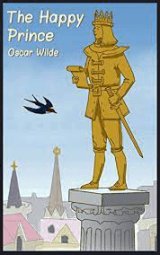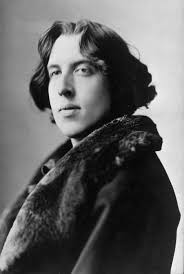The Happy Prince Page #10
The Happy Prince and Other Tales is a collection of stories for children by Oscar Wilde first published in May 1888. It contains five stories: "The Happy Prince", "The Nightingale and the Rose", "The Selfish Giant", "The Devoted Friend", and "The Remarkable Rocket".
swan, and between the swan’s wings lay the little Princess herself. Her long ermine-cloak reached right down to her feet, on her head was a tiny cap of silver tissue, and she was as pale as the Snow Palace in which she had always lived. So pale was she that as she drove through the streets all the people wondered. “She is like a white rose!” they cried, and they threw down flowers on her from the balconies. [Picture: Decorative graphic of young man kissing the princess’ hand] At the gate of the Castle the Prince was waiting to receive her. He had dreamy violet eyes, and his hair was like fine gold. When he saw her he sank upon one knee, and kissed her hand. “Your picture was beautiful,” he murmured, “but you are more beautiful than your picture”; and the little Princess blushed. “She was like a white rose before,” said a young Page to his neighbour, “but she is like a red rose now”; and the whole Court was delighted. For the next three days everybody went about saying, “White rose, Red rose, Red rose, White rose”; and the King gave orders that the Page’s salary was to be doubled. As he received no salary at all this was not of much use to him, but it was considered a great honour, and was duly published in the Court Gazette. When the three days were over the marriage was celebrated. It was a magnificent ceremony, and the bride and bridegroom walked hand in hand under a canopy of purple velvet embroidered with little pearls. Then there was a State Banquet, which lasted for five hours. The Prince and Princess sat at the top of the Great Hall and drank out of a cup of clear crystal. Only true lovers could drink out of this cup, for if false lips touched it, it grew grey and dull and cloudy. “It’s quite clear that they love each other,” said the little Page, “as clear as crystal!” and the King doubled his salary a second time. “What an honour!” cried all the courtiers. After the banquet there was to be a Ball. The bride and bridegroom were to dance the Rose-dance together, and the King had promised to play the flute. He played very badly, but no one had ever dared to tell him so, because he was the King. Indeed, he knew only two airs, and was never quite certain which one he was playing; but it made no matter, for, whatever he did, everybody cried out, “Charming! charming!” The last item on the programme was a grand display of fireworks, to be let off exactly at midnight. The little Princess had never seen a firework in her life, so the King had given orders that the Royal Pyrotechnist should be in attendance on the day of her marriage. “What are fireworks like?” she had asked the Prince, one morning, as she was walking on the terrace. “They are like the Aurora Borealis,” said the King, who always answered questions that were addressed to other people, “only much more natural. I prefer them to stars myself, as you always know when they are going to appear, and they are as delightful as my own flute-playing. You must certainly see them.” So at the end of the King’s garden a great stand had been set up, and as soon as the Royal Pyrotechnist had put everything in its proper place, the fireworks began to talk to each other. “The world is certainly very beautiful,” cried a little Squib. “Just look at those yellow tulips. Why! if they were real crackers they could not be lovelier. I am very glad I have travelled. Travel improves the mind wonderfully, and does away with all one’s prejudices.” “The King’s garden is not the world, you foolish squib,” said a big Roman Candle; “the world is an enormous place, and it would take you three days to see it thoroughly.” “Any place you love is the world to you,” exclaimed a pensive Catherine Wheel, who had been attached to an old deal box in early life, and prided herself on her broken heart; “but love is not fashionable any more, the poets have killed it. They wrote so much about it that nobody believed them, and I am not surprised. True love suffers, and is silent. I remember myself once—But it is no matter now. Romance is a thing of the past.” “Nonsense!” said the Roman Candle, “Romance never dies. It is like the moon, and lives for ever. The bride and bridegroom, for instance, love each other very dearly. I heard all about them this morning from a brown-paper cartridge, who happened to be staying in the same drawer as myself, and knew the latest Court news.” But the Catherine Wheel shook her head. “Romance is dead, Romance is dead, Romance is dead,” she murmured. She was one of those people who think that, if you say the same thing over and over a great many times, it becomes true in the end. Suddenly, a sharp, dry cough was heard, and they all looked round. It came from a tall, supercilious-looking Rocket, who was tied to the end of a long stick. He always coughed before he made any observation, so as to attract attention. “Ahem! ahem!” he said, and everybody listened except the poor Catherine Wheel, who was still shaking her head, and murmuring, “Romance is dead.” “Order! order!” cried out a Cracker. He was something of a politician, and had always taken a prominent part in the local elections, so he knew the proper Parliamentary expressions to use. “Quite dead,” whispered the Catherine Wheel, and she went off to sleep. As soon as there was perfect silence, the Rocket coughed a third time and began. He spoke with a very slow, distinct voice, as if he was dictating his memoirs, and always looked over the shoulder of the person to whom he was talking. In fact, he had a most distinguished manner. “How fortunate it is for the King’s son,” he remarked, “that he is to be married on the very day on which I am to be let off. Really, if it had been arranged beforehand, it could not have turned out better for him; but, Princes are always lucky.” “Dear me!” said the little Squib, “I thought it was quite the other way, and that we were to be let off in the Prince’s honour.” “It may be so with you,” he answered; “indeed, I have no doubt that it is, but with me it is different. I am a very remarkable Rocket, and come of remarkable parents. My mother was the most celebrated Catherine Wheel of her day, and was renowned for her graceful dancing. When she made her great public appearance she spun round nineteen times before she went out, and each time that she did so she threw into the air seven pink stars. She was three feet and a half in diameter, and made of the very best gunpowder. My father was a Rocket like myself, and of French extraction. He flew so high that the people were afraid that he would never come down again. He did, though, for he was of a kindly disposition, and he made a most brilliant descent in a shower of golden rain. The newspapers wrote about his performance in very flattering terms. Indeed, the Court Gazette called him a triumph of Pylotechnic art.” “Pyrotechnic, Pyrotechnic, you mean,” said a Bengal Light; “I know it is Pyrotechnic, for I saw it written on my own canister.”
Translation
Translate and read this book in other languages:
Select another language:
- - Select -
- 简体中文 (Chinese - Simplified)
- 繁體中文 (Chinese - Traditional)
- Español (Spanish)
- Esperanto (Esperanto)
- 日本語 (Japanese)
- Português (Portuguese)
- Deutsch (German)
- العربية (Arabic)
- Français (French)
- Русский (Russian)
- ಕನ್ನಡ (Kannada)
- 한국어 (Korean)
- עברית (Hebrew)
- Gaeilge (Irish)
- Українська (Ukrainian)
- اردو (Urdu)
- Magyar (Hungarian)
- मानक हिन्दी (Hindi)
- Indonesia (Indonesian)
- Italiano (Italian)
- தமிழ் (Tamil)
- Türkçe (Turkish)
- తెలుగు (Telugu)
- ภาษาไทย (Thai)
- Tiếng Việt (Vietnamese)
- Čeština (Czech)
- Polski (Polish)
- Bahasa Indonesia (Indonesian)
- Românește (Romanian)
- Nederlands (Dutch)
- Ελληνικά (Greek)
- Latinum (Latin)
- Svenska (Swedish)
- Dansk (Danish)
- Suomi (Finnish)
- فارسی (Persian)
- ייִדיש (Yiddish)
- հայերեն (Armenian)
- Norsk (Norwegian)
- English (English)
Citation
Use the citation below to add this book to your bibliography:
Style:MLAChicagoAPA
"The Happy Prince Books." Literature.com. STANDS4 LLC, 2024. Web. 24 Nov. 2024. <https://www.literature.com/book/the_happy_prince_1431>.




Discuss this The Happy Prince book with the community:
Report Comment
We're doing our best to make sure our content is useful, accurate and safe.
If by any chance you spot an inappropriate comment while navigating through our website please use this form to let us know, and we'll take care of it shortly.
Attachment
You need to be logged in to favorite.
Log In